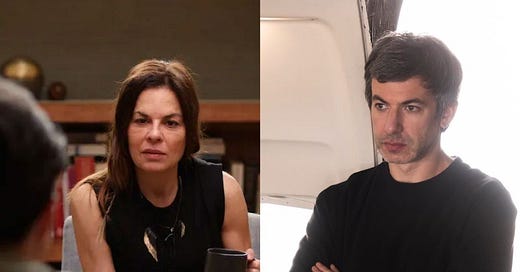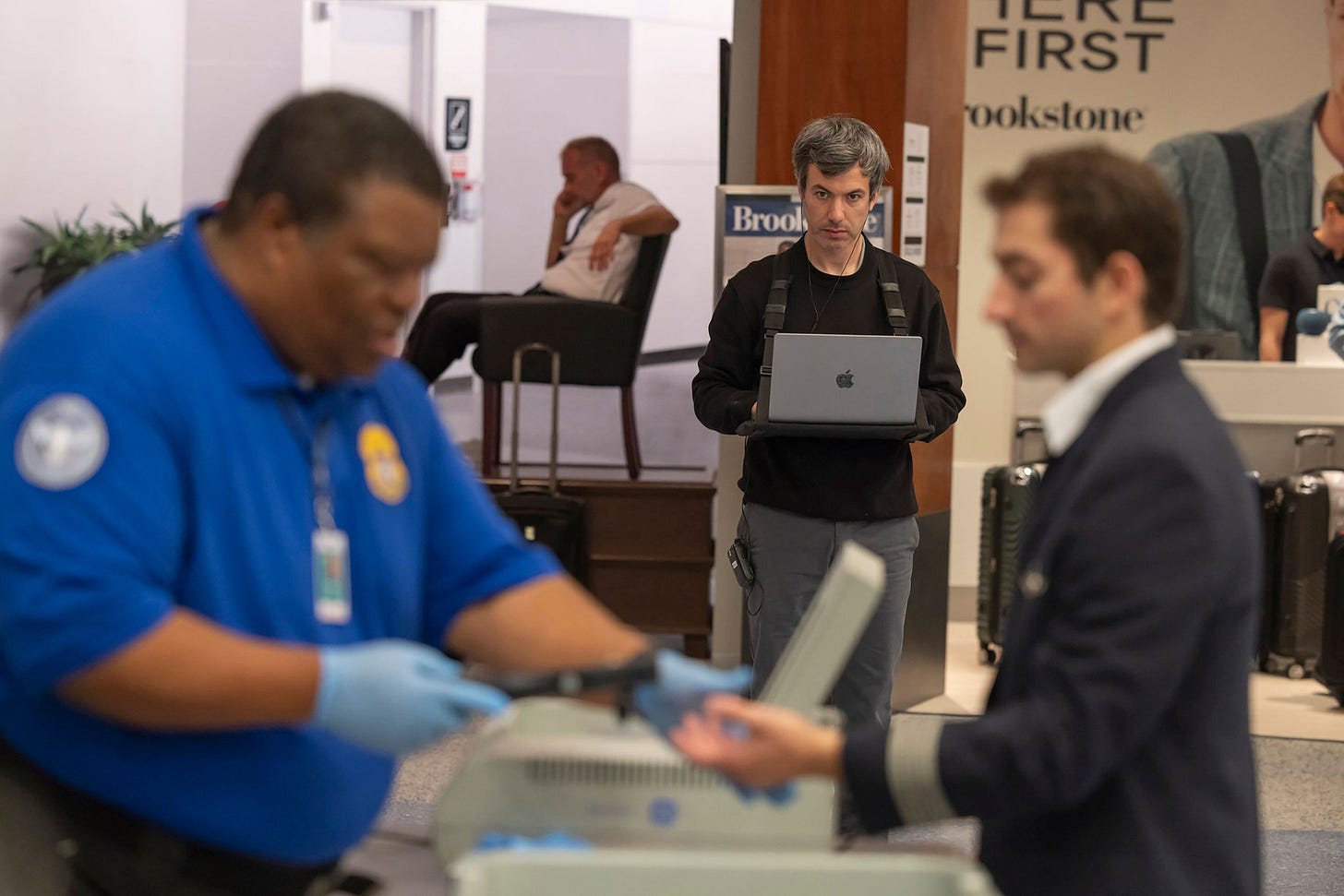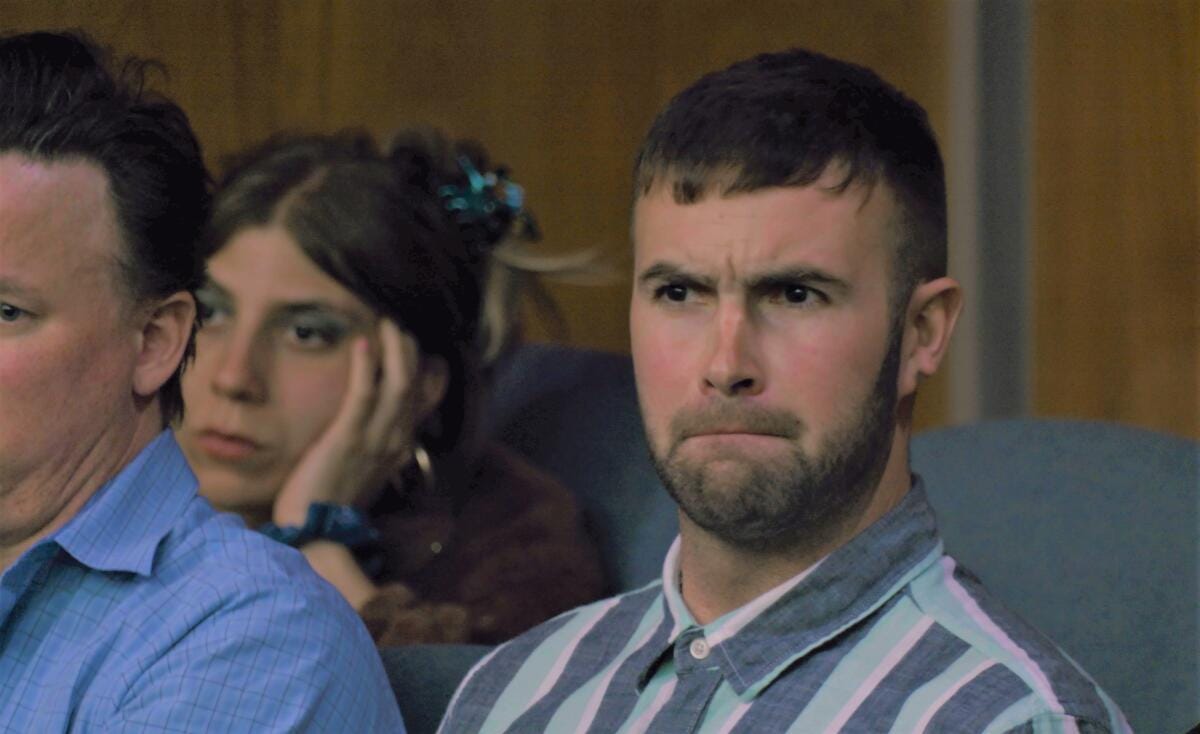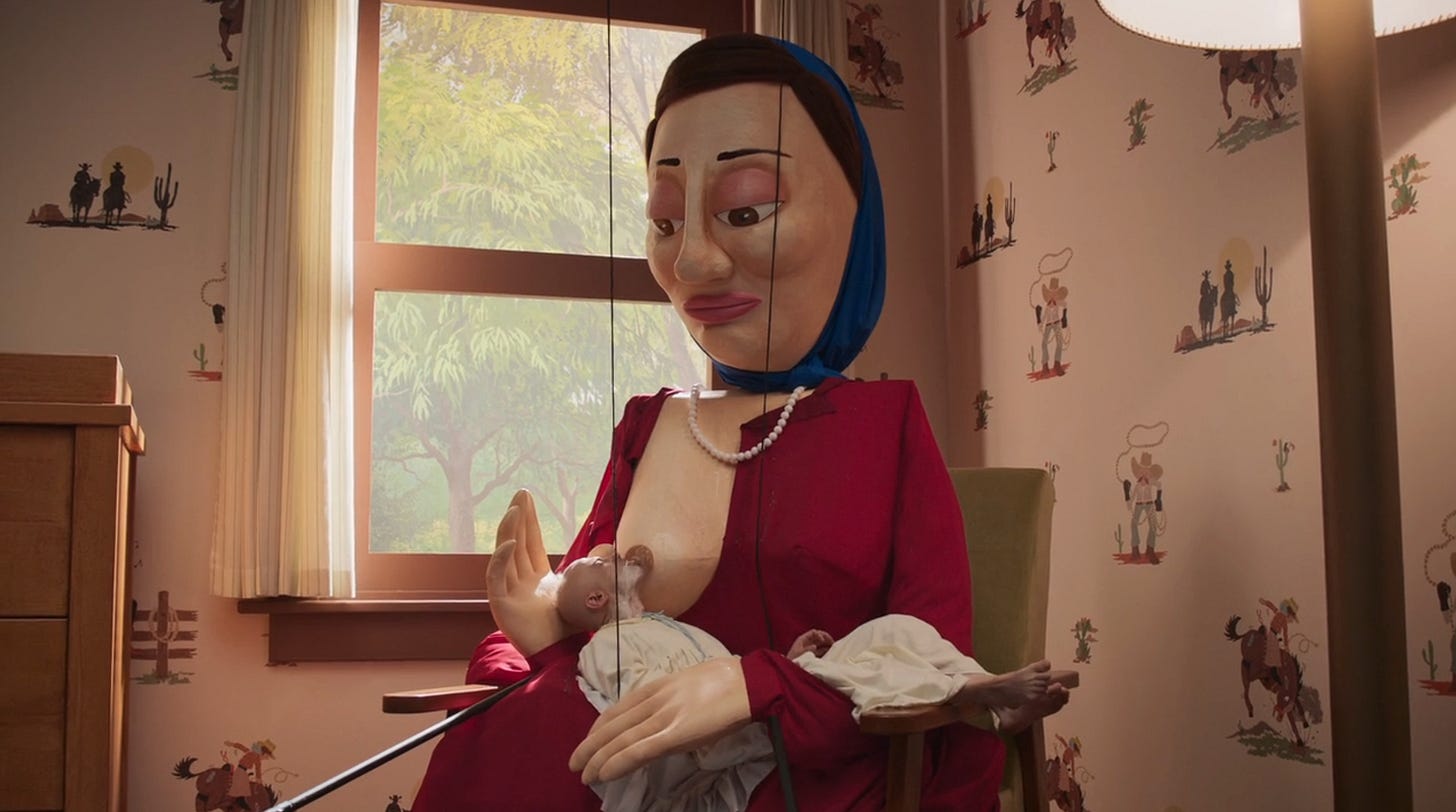The Everyday Sublime
A new round of docu-series like The Rehearsal and Couples Therapy capture the beauty and entertainment value of ordinary life.
Greetings friends and foes alike!
Apologies for the gap in between my posts. To be honest, this is for a few reasons— first of all, I’ve been busy with some new projects that I’ve been super jazzed about. I have two TV projects I finished recently and about to start pitching to producers (!), and am pitching on my first graphic novel adaptation, which has been a very exciting learning opportunity. It’s really nice to be feeling so inspired with my writing and I’m already brainstorming what project I want to take on next :). And then also, (and yes, despite popular belief, this does happen)… I just haven’t found myself as interested in watching TV in the last month or two. Sometimes I go through phases like this where I just want to get out of the house and not live my life through a screen. Sorry! Haters gonna hate! And I’ve been up to a lot of fun stuff— going to the LA county fair, a renaissance fair, a kite festival, a hot yoga class, Dyke Day for pride, and camping in Yosemite. It’s like that Lady Gaga meme about going from a bus to a plane to another club except every event is something stupid and silly. It’s summer, baby!
Maybe it’s because I’m craving more of that “real life feel,” but I’ve found myself being drawn to documentary series over the last month. In particular, I was so thrilled for the return of two of my favorite shows— season 4B of Couples Therapy on Paramount+ and season 2 of The Rehearsal on HBO Max. Even though these documentary series are, on their faces, incredibly different— Couples Therapy is a realistic and grounded look at couples as they navigate the serious process of couples therapy over 10 weeks, while The Rehearsal is a semi-scripted docu-comedy series that is essentially an absurd experiment in using rehearsals to navigate daily life— watching them side by side, I actually started to find them to be in strong conversation with each other. In particular, I was struck by their investment in the entertainment value and high stakes of everyday life relationships.
Compared to much other reality TV about relationships that treat love like a game to be won, Couples Therapy is a sobering reminder that real relationships take WORK. In their sessions with Dr. Orna Guralnik, the couples, who often have been together for years, navigate extremely serious problems— this season deals with topics like abuse, disability, nonmonogomy, and eating disorders— amongst the couple’s already complex communication problems and relationship dynamics. But that certainly doesn’t mean the show is depressing to watch— sometimes the comedy of moments can catch you completely off guard. Like when one of the participants this season, Boris, goes on a tirade about how he can’t find any good apples in New York City (has he tried a farmers market?). Or when one of the couples, Allison and Rod, are caught arguing before they even walk into Dr. Orna’s office, and then deny it to her face. By comparison, other reality shows are over-produced to create as much ridiculous drama as possible— look at the stinging sound cues and quick-paced editing, (often scripted) fight scenes, and absurd situations couples are placed in to create imaginary conflict (You can’t look at your partner before you meet them! You can ONLY look at your partner before you meet them! You meet your partner with a kiss! You can’t kiss your partner at all!). Couples Therapy, on the other hand, is certainly edited a bit, but it’s so realistically done that it almost gives the sensation that you’re a fly on the wall observing real couples have real problems.
What’s amazing about a show like Couples Therapy is that it SHOULD be boring. It SHOULD be serious. That shows like Love is Blind or Temptation Island SHOULD be more fun. But Couples Therapy is far, far more entertaining. I personally gathered a bunch of friends together over cake (shoutout Salt & Straw for their carrot cake ice cream cake) to watch the new season drop, and we shouted at the TV, laughed out loud, and gasped like it was a game of basketball (and yes, nearly everyone there was gay). The nine 30-minute episodes of Couples Therapy are so packed full of entertainment value, that shows with a drawn-out forty episode season like Love Island pale in comparison. And what’s incredible is that Couples Therapy finds the drama and the comedy in the ordinary— peeling back the curtain of the regular life that a person who could be sitting across from you on the subway is living. So when someone on the show like Allison stops herself from repeating old argument patterns and instead tries a new communication approach, it’s practically a cheer-worthy moment. The show treats personal growth and adult relationships with the gravitas and entertainment value they deserve.
This season of The Rehearsal similarly takes ordinary human interactions and ratchets up the stakes to literally life or death. In the first scene of the season, the show lays out its thesis: Creator and star Nathan Fielder watches as actors playing pilots recreate deadly commercial plane crashes from the past several decades. In all of them, the first officer alerts the captain to a problem, but is somehow shut down by the captain in a conversation. There are awkward moments, tense pauses, unequal power dynamics— a relationship dynamic between the two people that is not working like it’s intended to. And then, the plane crashes. Fire bursts, the actors slump over, playing dead. It’s harrowing to watch, honestly. In each of the scenes, we see how a poor one-on-one interaction between the captain and their first officer can become deadly. The consequences of an ordinary relationship dynamic couldn’t be higher.
Nathan Fielder has always had an obsession with how ordinary people respond to extraordinary circumstances. His incredible show Nathan for You was almost an exercise to see what real people would allow with the pressure of cameras and a TV host put on them. And the show’s best episodes find the stranger-than-fiction comedy with moments that show just how utterly bizarre real people are with a camera put on them— like the real estate agent who goes into a full-body possession after being told the house she’s in is haunted, or the man who freely admits to drinking his nephew’s urine. And the first season of The Rehearsal also found the comedy in putting an absurd level of importance on normal, everyday interactions— spending a ridiculous amount of money and time on helping a man admit to his trivia night partner that he didn’t really have a master’s degree. Nathan Fielder has always had an interest in taking a microscope to ordinary people and finding the beauty, strangeness, and humor in all of them. Even “difficult” or “strange” people like Angela in the first season of The Rehearsal have their perspectives treated sympathetically and without unnecessary mockery. What he is saying is that people matter, and their lives deserve our attention.
And the second season of The Rehearsal is no different. By essentially stating that awkwardness and skewed power dynamics have life-or-death stakes, Nathan Fielder is able to explore different ways people can strengthen their relationships, and thus strengthen the society we live in. And to be sure, the show is still a comedy. There are also bizarre and hilarious gags like Nathan dressing as a baby Sully Sullenberger or a fake singing competition in the vein of “Canadian Idol.” This is entertainment, after all! But behind the comedy, to me, is a very poignant look at how isolation, mistrust, and hierarchy have put all our lives at risk (if you want your exploration of the male loneliness epidemic, here it is!) Nathan points out that pilots are afraid to get diagnoses for their health problems, see therapists, become friendly or build a rapport with their co-pilots, or even take risks in their personal romantic lives. And watching the show feels similar to watching Couples Therapy— where the smallest interpersonal moments can feel giant. Moments like when first officer Colin kisses his crush or when Nathan is able to build the skills to reject a singer for his competition show in a “kind” way (by the way, explaining the context for these moments would honestly be impossible), feel like huge victories. The humanist attitude of this show— putting real people front and center, and taking their real lives seriously— is a momentous achievement in television.
And these are certainly not the only shows to take such a keen interest into the everyday lives of ordinary people. Breakout docu-comedy show Jury Duty, which created a fake staged court trial for unaware “regular guy” Ronald Gladden, found the humor and pathos in a “nice guy” just “trying to do the right thing” despite outlandish circumstances. And in a swath of exploitative reality dating shows, Netflix’s Love on the Spectrum attempts to present a realistic look at ordinary autistic people dating. Sure, the show has funny moments (typically due to a misunderstanding or awkward behavior between the participants), but there’s also real beauty in watching regular people strive to find love in a society that’s not built for them. There’s also HBO Max’s fantastic docu-comedy series How To with John Wilson (also produced by Nathan Fielder) and Jerrod Carmichael Reality Show, which both mine the entertainment value of their subjects’ strange and imperfect lives.
As I mentioned with my last article on The Pitt and Adolescence, I think in our current world of over-produced, over-edited, and hyper-real content, there’s an audience appetite to find programming that is grounded and naturalistic. These docu-series, in a similar vein to those scripted dramas, have a keen interest in human nature and the routine of the everyday that people might be drawn to given how “fake” the rest of our content is. It’s the same reason why people love a “day in the life” video on TikTok or long, unedited interviews on YouTube with celebrities— they want authenticity (or at least the illusion of authenticity). I’ve always been someone who believes that everybody is a secret freak (in the best possible way), and as these shows prove, if you keep the cameras running long enough, people’s freaky sides will eventually come out. And that’s absolutely incredible! The more that we break down the illusion of “normalcy” and treat everybody, despite their flaws, with empathy, the better for our society. That’s maybe a lot of pressure to put on a show that also has a scene of Nathan Fielder drinking breast milk from a giant puppet, but I believe if anybody can find a way to heal our broken nation… it’s that man.
What Else I’m Currently Enjoying:
The Gilded Age, Season 3
Poker Face, Season 2
Adults, Season 1
Your Name. - dir. Makoto Shinkai
Materialists - dir. Celine Song
Mission Impossible: the Final Reckoning - dir. Christopher McQuarrie
Sinners - dir. Ryan Coogler
Broadcast News - dir. James L. Brooks
John Proctor is the Villain - dir. Danya Taymor
Virgin - Lorde
I Quit - Haim
Sable, Fable - Bon Iver
If you enjoyed this post, click below to subscribe for all future Story Arc newsletters. Thanks for reading!









